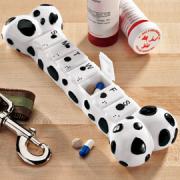Pet Medications: 6 Tips to Keep Pets Safe

Pet Medications: 6 Tips to Keep Pets Safe
All of us want to give the best and safest medications to our pets. Here are my tips to make sure your pet gets the medications he needs.
1. Approved is easy
Some of the work of selecting safe medications for your pet has already been done for you. The United States Food and Drug Administration (FDA) approves medications for use in pets by a similar process used for human drugs. Animal vaccines receive approval from the United States Department of Agriculture and treatments to prevent ectoparasites, also known as flea and tick preventatives, by the Environmental Protection Agency. Approved medications help you ensure you are administering drugs that have met standards for both safety and efficacy.
2. Don’t play veterinarian and give your own medications to your pet.
Certain human medications can be lethal to pets. For example, acetaminophen (a common brand is Tylenol) in cats, ibuprofen (a common brand is Advil) in dogs. The leading phone call to animal poison control experts is about accidental or owner administered human medications.
3. Human pharmacies
Like nearly all veterinarians, I too prescribe human medications for my patients. I do this for convenience when the pet owner is far from The Animal Medical Center or because there is not a veterinary-approved version of the drug. Human medications are most often a solution for dogs over 40 or 50 pounds, since tablet and pill sizes are too big for cats and little dogs. So if it is Saturday night and your veterinarian tells you to come to the clinic to pick up medication, it is because nothing but a doggie drug or kitty capsule will do.
4. Legal drugs
The law requires all veterinarians to prescribe medications only in the context of a valid veterinarian-client-patient relationship. Translated from the legalese, the statement means I have to examine your pet in order to prescribe a medication. This is all about safety –Fluffy’s safety. Although you are sure she has the same skin condition as last year, I need to be sure you are correct in order to prescribe the medication with the best chance of fixing the problem with the least risk of an adverse reaction.
5. Custom compounding
Veterinarians rely on compounding pharmacies to convert pills and tablets into chicken-flavored liquids, to place multiple medications into a single capsule to simplify medicating the pet with bear trap-like jaws, or to scale down a large tablet for a tiny terrier. Regulations govern compounding like they do for any prescription. Prescriptions for compounded medications can only be written on a case-by-case basis and must be made specifically for an individual pet. Compounded medications may mean the difference between therapeutic success and failure, but because compounded products are not regulated, products may be of variable quality as demonstrated in a recent scientific study of compounded trilostane. Using a pharmacy certified by the Pharmacy Compounding Accreditation Board assures you of a compounding pharmacy that adheres to established principles, policies and standards.
6. Internet pharmacies
The challenge in using an internet pharmacy is finding the right one. Although the prices offered by electronic drug stores are attractive, high-quality service may be lacking. Red flags in online reviews include companies who fill email boxes with spam, distribute counterfeit products, or never ship product at all. I spoke with the CEO of PetCare Rx, Jonathan Shapiro, about how his company ensures the quality of medications they ship. “PetCare Rx purchases product directly from the manufacturer or veterinary purchasing groups to protect our customers from counterfeit products. Consumers should look for an internet pharmacy accredited by the Veterinary Verified Internet Pharmacy Practice Sites (Vet-VIPPS). This accreditation ensures the pharmacy complies with regulations and laws governing pharmacy practice.”


































